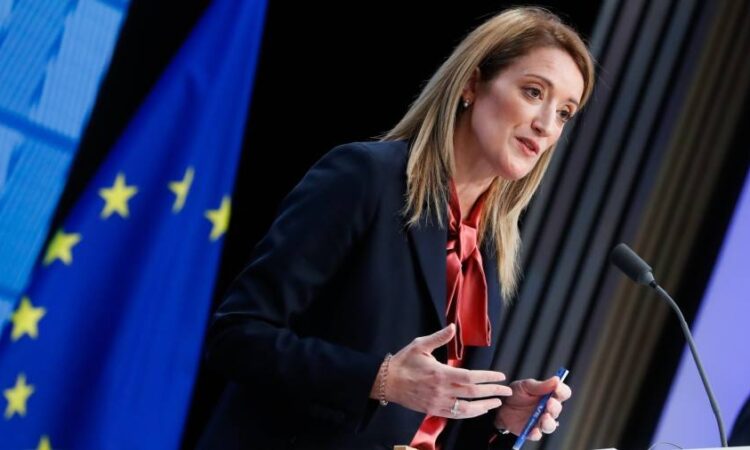
The European parliament’s president has backed more ethics reforms in the wake of a sprawling corruption probe by Belgian investigators, amid criticism that her initial proposals were insufficient.
Roberta Metsola said in an interview that she wanted her 14-point plan to be delivered “within a month”, but that additional measures including proposals for an EU-wide ethics body and an inquiry into corruption in the parliament could follow once the current criminal investigation is wrapped up.
“What we are facing is criminal corruption of the most basic, elemental and historic [kind],” Metsola said.
Four suspects are in Belgian custody on corruption and money laundering charges, of which three have worked in the European parliament. The main suspect, Pier Antonio Panzeri, served three terms as MEP until 2019. His former aide, Francesco Giorgi, is a parliamentary assistant and husband of the third suspect, Eva Kaili, herself an MEP who until her arrest was also a vice-president of the parliament.
Belgian prosecutors have asked the parliament to lift the immunity of two further lawmakers, a process which will start on Monday.
Metsola defended her initial set of reforms, which she laid out in detail last week: “These are measures to address it, not to purge it forever, because I can never predict what will be the next [scandal]”. The measures include cutting the access of former MEPs-turned-lobbyists, making publication of meetings mandatory and banning informal groups that promote external interests.
In addition, convicted lawmakers could be stripped of their generous EU pension after two years, Metsola said, a measure that she discussed with political group leaders on Thursday.
Setting up an independent ethics body for all EU institutions, that would enforce rules, is also being considered in the longer term. But it would have to be proposed by the European Commission as parliament lacks the legislative power to do so, Metsola said.
“What applies here should apply to other institutions as well. This is important for a lot of members,” she said.
The commission has said that it is looking to set up a “truly inter-institutional” ethics body and would “move swiftly” to establish it.
Still, several EU lawmakers argue that the president’s reforms fall short of what they called for in December, for instance a ban on MEPs accepting trips paid for by third countries.
“The plan of Metsola is a start but cannot and should not be the end. I hope and assume that the discussion [among the parliamentary leaders] has made that clear,” said Paul Tang, a Dutch socialist MEP.
Manon Aubry, a leftwing French lawmaker, also found the reform plans wanting. “Parliament is going through the worst scandal in its history and its credibility is in question,” Aubry tweeted. “To go back on the sly on the proposals adopted in December would be a disgrace.”
The controversy has broken at a crucial time for the parliament, which this year starts to gear up for European elections in 2024. According to the most recent Global Corruption Barometer by Transparency International, 53 per cent of Europeans thought that narrow private interests guided politics and 28 per cent believed that most members of parliament were involved in corrupt activities — the highest of any profession listed.
The European parliament has been repeatedly criticised by transparency campaigners for being entirely self-policed and failing to ensure that its members declare external financial interests and gifts.
It has also consistently pushed back against allowing Olaf, the EU’s anti-fraud agency, from accessing MEPs offices if claims of fraud have been made.
Alina Mungiu-Pippidi, professor of democracy studies at Berlin’s Hertie School, said it was a “disaster for trust” in parliament, the longer the scandal lasted and the more there was “naming and shaming through the media and civil society”. Metsola’s reforms were “definitely not enough”, she added, finding it “shameless” that receiving gifts had not been forbidden.
Pascal Durand, a French socialist MEP, who previously worked on parliament’s rules of procedure, said that gifts could be permitted but that there should be “absolute transparency” about who had donated them.
Since 2019, just nine of the parliament’s 705 MEPs have declared gifts, which must be reported if they are valued at more than €150. Metsola said that she does not keep any gifts. .
“I look at every gift and I send it back and I go through a huge hassle,” she said, noting that “very few” other lawmakers do the same.
Additional reporting by Javier Espinoza






